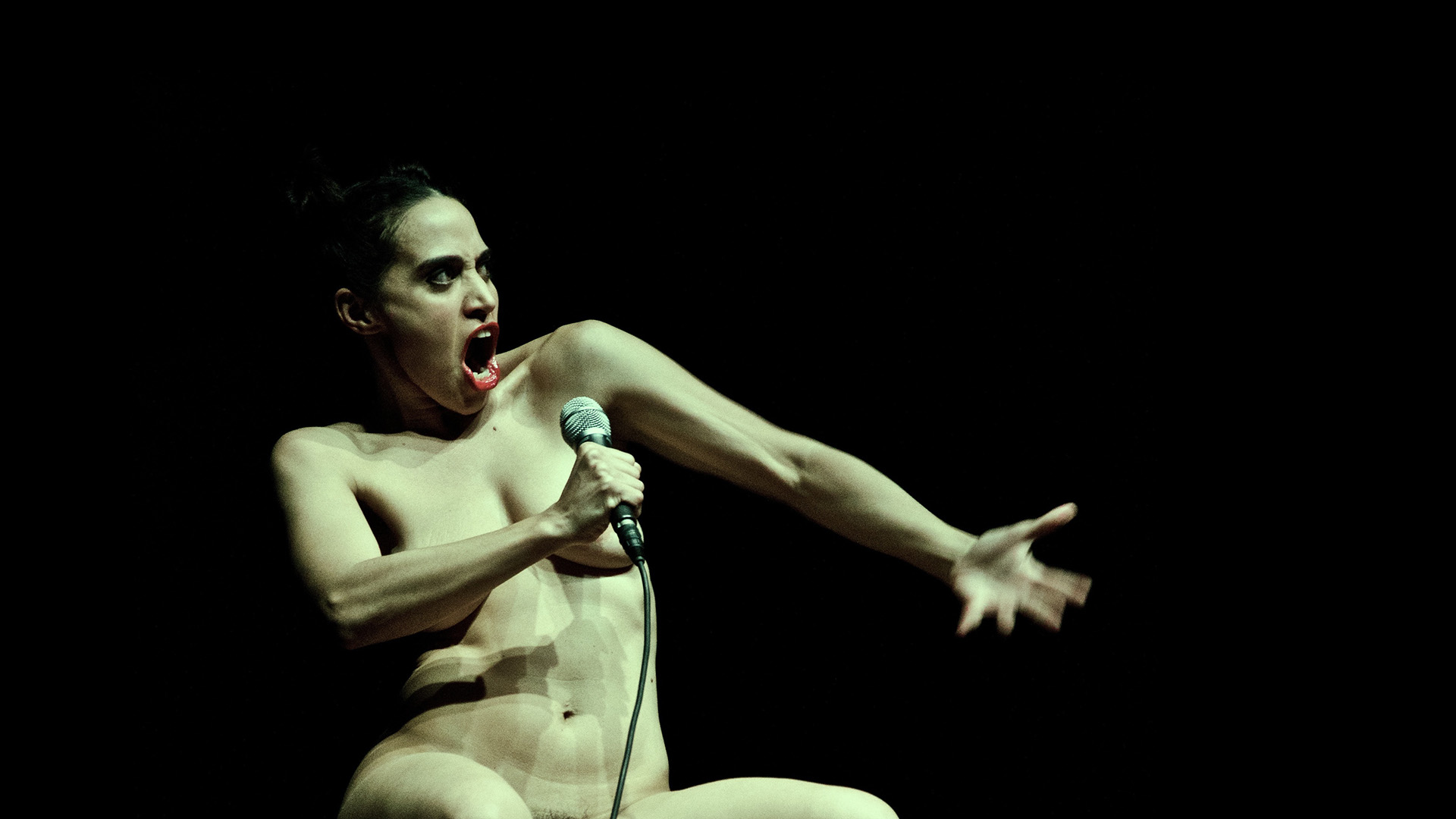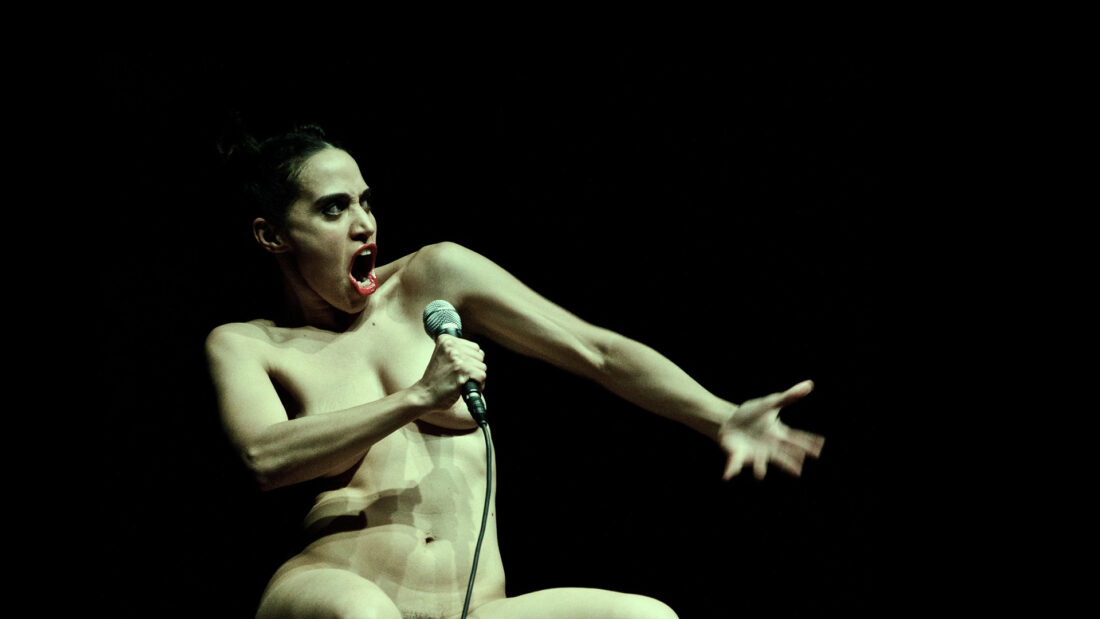ABC / La Merda: How a Culture of Celebrity Feeds a Returning Tide of European Neo-Nazism

ABC – ‘How a culture of celebrity feeds a returning tide of European neo-Nazism’
di Alison Croggon, Adelaide Festival of Arts
La Merda: interrogating celebrity, sexuality and nationalistic masculinity.
Silvia Gallerano’s performance in La Merda, at the Adelaide Festival, is more than a parade of female grotesquerie, writes Alison Croggon.
Like Dostoevsky’s nameless protagonist in Notes from Underground, Gallerano is shamelessly the sum of her humiliations and betrayals.
Silvia Gallerano is seated in a spotlight on a high black platform that looks like an oversized stool, naked aside from her makeup. The makeup is important: it is her single protection against complete exposure. It exaggerates her eyes so they flash in the light. A slash of red lipstick outlines her mouth, which is distorted and tormented, spitting out words as if they are the shit of the show’s title, grimacing in a smile that is at once apology and unacknowledged despair.
Her hair is tied up tightly in two knots, which makes her look like a child. It also draws attention to her resemblance to Frida Kahlo, the Mexican artist famous for her theatrical self portraits, emblematic and sometimes savage images of her own suffering. It’s no accident, I suspect, that Gallerano’s company is called Frida Kahlo Productions.
La Merda, at the Adelaide Festival, is a monologue of monstrous feminine abjection written by Cristian Ceresoli, the other half of Frida Kahlo Productions. It is given electrifying life in Gallerano’s performance, which is delivered in several pulses, punctuated by darkness. It is almost operatic in how language builds up to its grotesque arias, layering image upon image into a terrifying portrait of female self disgust. Like Dostoevsky’s nameless protagonist in Notes from Underground, Gallerano is shamelessly the sum of her humiliations and betrayals.
Over the course of an hour, La Merda weaves a complex web of metaphor that repeats its tropes into more and more monstrous forms. In this character’s psyche, the only resistance is self immolation: to say no takes courage, a word that returns again and again, and she only has the courage to submit. She can’t face her own failures, her own insignificance: her only recourse is to make a neurotic spectacle of her own desolation.
Gallerano’s nameless narrator is a wannabe celebrity. Her fantasy is to be the focus of recognition, the celebrity recognised in the next car, the focus of adoration, the swollen “me me me” of her dreams. Yet underneath this rampant narcissism yawns an appetite that cannot be appeased, and which her obsession only feeds. The more she negates herself, the more her narcissism metastases into madness.
There is no depth to which she will not sink. She dreams of eating her thighs, which she believes to be grotesque and misshapen, as female octopi are said to eat their tentacles. If she is summoned for an audition, she will do anything to meet its requirements. If, despite her horror of the volume of her own body, the celebrity machine demands that she be fat, she will make herself fat. She will humiliate herself, she will suck any cock, she will starve her body or feed it until it bursts. “Nothing disgusts me,” she says. You can, she says, get used to anything. It is the price, the sacrifice, the mark of courage.
Yet this show is not merely a parade of female grotesquerie. Winding through it is a critique of the fascistic core of patriarchy and nationalistic masculinity, which in turn distort women and their sexuality. The phallus that Gallerano’s character suffers, which rapes and humiliates her, is also the Italian flag, in which she wraps herself.
Although its resonance is uncomfortably general, it’s conditioned by Italian politics. It recalls, for example, how television celebrity and political and sexual power meet in the figure of Silvio Berlusconi, and how a culture of celebrity feeds a returning tide of European neo-Nazism. Gallerano’s character is haunted by her father, himself a Fascist, who killed himself when she was 13, because he would never be the Ubermensch of his fantasies. His suicide, at once his triumph and his failure, is the turning point of her life.
As the site of mortification, Gallerano’s body achieves an ecstatic state, not unlike the 17th century mystic, Saint Marguerite Marie Alacoque, who would lick up the vomit of invalids from the floor. But here there is no God: only man and his symbols, the phallus, the flag, the fasces, and the shit that is left to women and which, this character says, they must have the courage to embrace.
La Merda plays Space Theatre, Adelaide Festival Centre March 5 – 8, 2015




